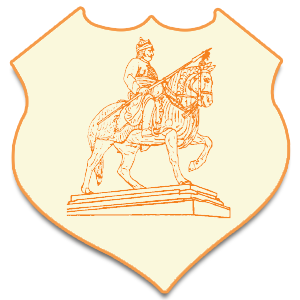Maharana Pratap
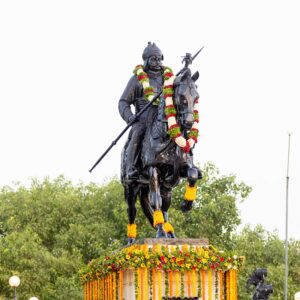
Not only Indians but all the freedom lovers all over the world are aware of the name and the greatness of Maharana Pratap. Maharana Pratap was born on 9th May 1540 CE (Jyestha maah, Shukla Paksha, Tritiya, Vikram Samvat 1597) in Kumbhalgarh. His father was Maharana Udai Singh II and mother name was Maharani Jevanta Kunwar. Maharana Pratap has been the supreme inspirational pillar of the Indian freedom struggle. Despite being surrounded by enemies on all sides in the forests, he organized and fought continuously for many years on the strength of his self-respect, self-confidence and finally won back his entire kingdom from Akbar. The virtues of these sacrifices, have immortalized him as inspiration for the struggle of Indian independence. Maharana Pratap’s personality is of a unique warrior and a freedom fighter; he has become a national symbol of struggle, renunciation, sacrifice, generosity and perseverance. Every revolutionary of India has continuously praised Maharana Pratap and drew inspiration from him.
प्रात: स्मरणीय वीर शिरोमणि महाराणा प्रताप
महाराणा प्रताप के नाम और महानता से न केवल भारतीय वरन् विश्व के सभी स्वतंत्रता प्रेमी परिचित हैं। देवताओ के बाद केवल इसी महान मानव को हमारे देशवासियों ने “प्रातःस्मरणीय” की उपाधि से अलंकृत किया है । महाराणा प्रताप का जन्म 09 मई 1540 ईस्वी (ज्येष्ठ माह शुक्ल पक्ष तृतीया विक्रम संवत्-1597) को कुम्भलगढ़ में हुआ था उनके पिता मेवाड़ महाराणा उदयसिंह (द्वितीय) तथा माँ जैवंता कुंवर थे। प्रताप भारतीय स्वतंत्रता संग्राम के सर्वोच्च प्रेरणा स्तम्भ रहे है। उन्होंने सर्वस्व गँवा कर भी स्वाभिमान व स्वतंत्रता के साथ समझौता नहीं किया। पहाड़ी वनों में हर तरफ शत्रुओ से घिरे रहकर भी उन्होंने संगठित होकर कई वर्षो तक मुगल बादशाह अकबर से अपने स्वाभिमान एंव आत्मविश्वास के बल पर निरंतर संघर्ष किया और अंततः अकबर से अपना पूर्ण राज्य वापस जीत लिया। इन दृढ-प्रतिज्ञ ,कठोर बलिदानों ,स्वातंत्र-तपस्या के गुणों ने इस वीर शिरोमणि को भारतीय स्वतंत्रता के संघर्ष के प्रेरणा -स्त्रोत के रूप में अमर कर दिया। महाराणा प्रताप का व्यक्तित्व अद्वितीय योद्धा और स्वतंत्रता सेनानी के रूप में संघर्ष, त्याग, उदारता और दृढ़ता के राष्ट्रीय प्रतीक बन गए। भारत के प्रत्येक बलिदानी, क्रांतिकारी ने निरंतर महाराणा प्रताप की जयकार की है तथा उनसे प्रेरणा प्राप्त की है।
Bhamashah
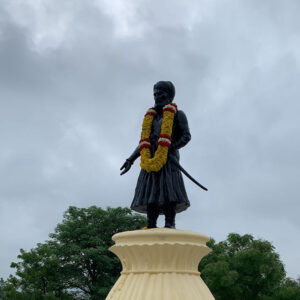
Bhamashah son of Bharmal, came from Alwar and was part of the Kavadia Oswal Jain community. After the famous battle of Bayana 21 February 1527, fought between Rana Sanga and Babar, who founded the Moghul dynasty in India, many supporters of the Rana who fought in this battle along side him, returned to Chittorgarh with him. Bharmal was also one of those who returned and Rana Sanga appointed him as ’Kiledar’ of the fort of Ranthambhor. Even after he no longer remained as keeper of the Ranthambhor Fort, his family remained closely associated with the Ranas.
Bhamashah distinguished himself in the battle field of Haldi Ghati. After Mahasani Rama, Rana Pratap elevated him to the post of the Prime Minister. Over the following decades Bhamashah’s son Jeewashah and his grandson Akshiraj were appointed Prime Ministers by Rana Amar Singh and Rana Karan Singh.
Bhamashah was a very loyal and trusted treasurer of Rana Pratap whose responsibility was to keep the treasury secure and provide funds for battle when required. At one time Rana Pratap became dejected on account of paucity of funds in the state and thought he could not continue to go into battle to protect the freedom of Mewar. Bhamashah who had accumulated great sources of wealth in the treasury came forward at the appropriate time to assist Rana Pratap in his quest for freedom.
भारमल के पुत्र भामाशाह अलवर से आये थे और कावड़िया ओसवाल जैन समुदाय का हिस्सा थे। बयाना की प्रसिद्ध लड़ाई 21 फरवरी 1527 के बाद, राणा सांगा और बाबर के बीच लड़ी गयी , जिन्होंने भारत में मुगल वंश की स्थापना की, राणा के कई समर्थक जो उनके साथ इस लड़ाई में लड़े, उनके साथ चित्तौड़गढ़ लौट आए। भारमल भी लौटने वालों में से एक थे और राणा सांगा ने उन्हें रणथंभौर के किले का ‘किलेदार’ नियुक्त किया। रणथंभौर किले के रक्षक के रूप में नहीं रहने के बाद भी, उनका परिवार राणाओं के साथ घनिष्ठ रूप से जुड़ा रहा।
भामाशाह ने हल्दीघाटी के युद्ध क्षेत्र में अपनी अलग पहचान बनाई। महासनी राम के बाद राणा प्रताप ने उन्हें प्रधानमंत्री पद तक पहुँचाया। बाद के दशकों में भामाशाह के पुत्र जीवशाह और उनके पोते अक्षिराज को राणा अमर सिंह और राणा कर्ण सिंह द्वारा प्रधान मंत्री नियुक्त किया गया।
भामाशाह राणा प्रताप के एक बहुत ही वफादार और भरोसेमंद कोषाध्यक्ष थे जिनकी जिम्मेदारी खजाने को सुरक्षित रखना और आवश्यकता पड़ने पर युद्ध के लिए धन उपलब्ध कराना था। एक समय राणा प्रताप राज्य में धन की कमी के कारण उदास हो गए और उन्होंने सोचा कि वह मेवाड़ की स्वतंत्रता की रक्षा के लिए लड़ाई में नहीं जा सकते। भामाशाह, जिन्होंने खजाने में धन के महान स्रोत जमा किए थे, स्वतंत्रता की तलाश में राणा प्रताप की सहायता के लिए उचित समय पर आगे आए।
Jhala Maan
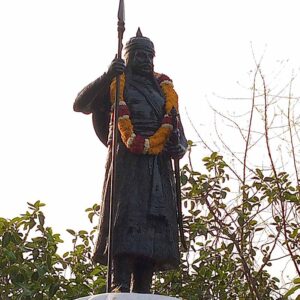
Jhala Maan was the fifth of the seven generations of his lineage of Badi Sadri, who, following their ancestors, laid down their lives on the battlefield to defend the motherland and faithfully serve the Maharanas of Mewar. In the historic battle of Haldighati, Jhala Maan seeing Maharana Pratap surrounded in the battlefield by enemies, he held the state insignia and saved Maharana’s life. He presented an ideal example of patriotism and loyalty, fought with the Mughals and on 18th June 1576, he attained martyrdom for the motherland.
बड़ी सादड़ी के झालामान अपने वंश की सात पीढ़ियों में से पाँचवी पीढ़ी के थे, जिन्होंने अपने पूर्वजो का अनुसरण करते हुए मातृभूमि की रक्षा के लिए और मेवाड़ के महाराणा की ईमानदारी से सेवा करते हुए युद्ध के मैदान में अपने प्राणों की आहुति दी। हल्दीघाटी के ऐतिहासिक युद्ध में झालामान ने महाराणा प्रताप को रणभूमि में शत्रुओं से घिरा देखकर राज्य चिह्न धारण किया और महाराणा की जान बचाई। उन्होंने देशभक्ति व स्वामिभक्ति का आदर्श उदाहरण प्रस्तुत करते हुए मुगलों से वीरता के साथ संघर्ष किया तथा 18 जून 1576 को मातृभूमि के लिए वीरगति को प्राप्त हुए |
Hakim Khan Sur
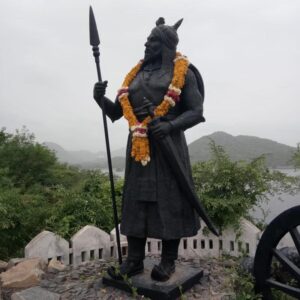
Hakim Khan Sur was a Pathan who came to Mewar from his domicile in Hyderabad, Deccan. He became a general in Rana Pratap’s army and fought to uphold the freedom and beliefs of his adopted home in the epic battle of Haldi Ghati (1576 CE) against the invading Mughal army of Emperor Akbar. This is the first recorded instance in the Annals of Mewar in which the responsibility of leading the Mewar Army was not entirely entrusted to Shaktawat or Chundawat brethren. This was the direct consequence of Hakim Khan Sur’s declared undertaking that no one would be able to part him from his sword in battle. Despite being a follower of Islam, he laid down his life in battle fighting against his blood brothers thereby fulfilling his commitment to uphold the freedom and honour of Mewar. Even in death no one could part him from his sword and he was buried with full honours with his sword in hand.
His sacrifice is symbolic of the supremacy of ideology over religious and communal consideration – a unique example of his belief in the principles and commitment of unquestionable loyalty and devotion to Manav Dharma.
हकीम खान सूर एक पठान थे जो हैदराबाद, डेक्कन में अपने अधिवास से मेवाड़ आए थे। वह राणा प्रताप की सेना में एक सेनापति थे और सम्राट अकबर की हमलावर मुगल सेना के खिलाफ हल्दी घाटी (1576 ई.) की लड़ाई में अपने गोद लिए हुए घर की स्वतंत्रता और विश्वास को बनाए रखने के लिए लड़े। मेवाड़ के इतिहास में यह पहला दर्ज उदाहरण है जिसमें मेवाड़ सेना का नेतृत्व करने की जिम्मेदारी पूरी तरह से शक्तावत या चुंडावतो को नहीं सौंपी गई थी। यह हकीम खान सूर के घोषित वचन का प्रत्यक्ष परिणाम था कि कोई भी उन्हें युद्ध में अपनी तलवार से अलग नहीं कर पाएगा। इस्लाम के अनुयायी होने के बावजूद उन्होंने अपने भाइयों के खिलाफ लड़ाई में अपना जीवन लगा दिया और मेवाड़ की स्वतंत्रता और सम्मान को बनाए रखने की अपनी प्रतिबद्धता को पूरा किया। मृत्यु समय में भी कोई उन्हें उनकी तलवार से अलग नहीं कर सका और हाथ में तलवार लिए उन्हें पूरे सम्मान के साथ दफनाया गया।
उनका बलिदान धार्मिक और सांप्रदायिक विचारों पर विचारधारा की सर्वोच्चता का प्रतीक है – मानव धर्म के प्रति निर्विवाद निष्ठा और समर्पण के सिद्धांतों और प्रतिबद्धता में उनके विश्वास का एक अनूठा उदाहरण है।
Rana Punja
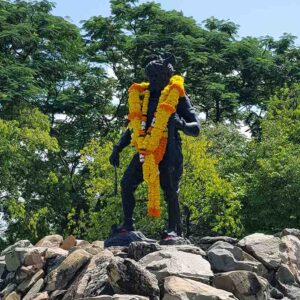
Rana Punja, popularly known as Bhilu Rana, was the head of the Bhil community of Merpur-Panarwa in the Bhomat region of Mewar. He was one of the most trusted leaders who fought with his fellow tribesmen alongside Maharana Pratap in the famous battle of Haldighati on 18th June 1576 CE. Even after the battle of Haldighati he and his fellow tribesmen came forward frequently to assist the Maharanas to maintain the freedom of Mewar. In honour of the sacrifices made and the tribal blood-shed for the defence of the motherland, Punja’s representation as the protector of the state is upheld even today on the royal emblem of Mewar.
राणा पुंजा मेवाड़ के भोमट क्षेत्र में मेरपुर-पनरवा के भील समुदाय के मुखिया जो कि भीलू राणा के नाम से लोकप्रिय थे। वह महाराणा प्रताप के विश्वासपात्र नेताओं में से एक थे, जिन्होंने 18 जून 1576 को हल्दीघाटी की प्रसिद्ध लड़ाई में अपने साथी आदिवासियों के साथ महाराणा प्रताप का साथ दिया था। हल्दीघाटी की लड़ाई के बाद भी वह और उनके साथी मेवाड़ की स्वतंत्रता को बनाए रखने के लिए महाराणाओं की सहायता के लिए सदैव अग्रणी रहे। मातृभूमि की रक्षा के लिए दिए गए बलिदान तथा बहाए गए आदिवासी रक्त के सम्मान में, मेवाड़ के शाही प्रतीक पर आज भी राज्य के रक्षक के रूप में राणा पुंजा के प्रतिनिधित्व को सम्मानस्वरूप बरकरार रखा गया है।
